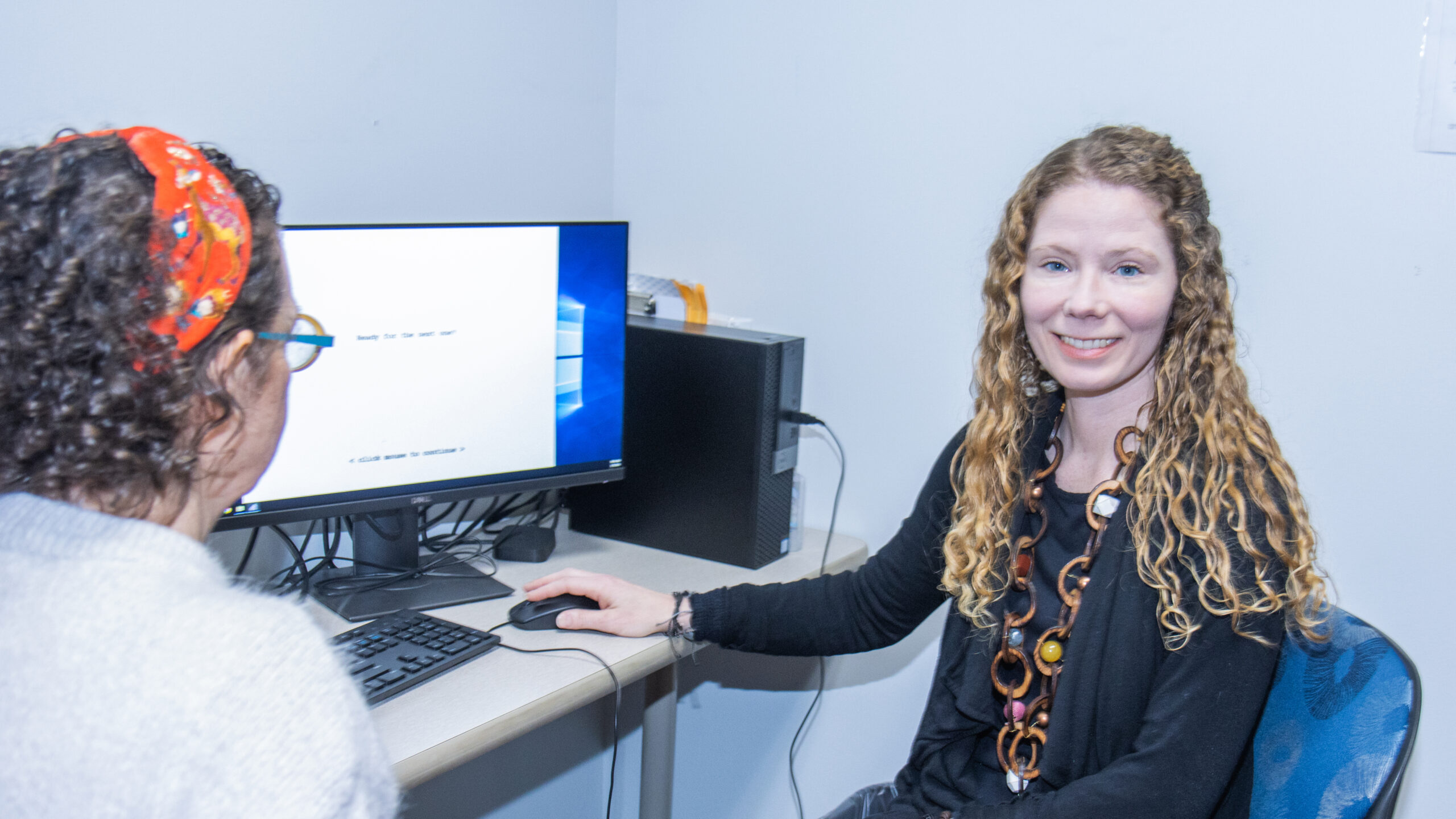Compiled by Sarah Newell
Women in science are celebrated internationally on Feb. 11, but at the UNCG School of Health and Human Sciences, women are involved in significant science and scientific leadership year-round. This research includes lab work, field work, independent study, interdisciplinary projects, and community partners.
Here is just a sampling of some of the notable achievements being made within HHS, and words of wisdom for others looking to get started.
Dr. Bridget Cheeks, Department of Human Development and Family Studies
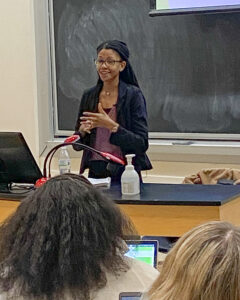
1. How long have you been at UNCG?
For six years, since fall 2018.
2. How did you get interested in your field of research?
By participating in undergraduate research opportunities. I participated in federally funded TRIO programs like the Ronald McNair Program and STARS, and the Summer Research Opportunity Program (SROP). I also was an undergraduate research assistant for one of my professors while in college at Bowling Green State University (Ohio).
The experiences I gained from these opportunities were invaluable to my development as a researcher. I received mentorship, conducted independent research projects, presented at conferences, and received preparation for applying to graduate schools.
3. What research are you currently working on and what does it entail?
Currently I am a collaborator on a three-year project funded by the National Science Foundation (NSF) with my colleagues at Washington University in St. Louis. The study is a mixed methodological investigation of Black families’ resilience against marginalization, focusing on parenting practices and adolescent developmental trajectories.
The project involves two phases of research with Black parents and adolescents: annual survey data to examine the influence of parents’ race-related experiences and racial socialization competencies on adolescent outcomes; and in-depth qualitative analysis exploring parents’ perceptions of the factors that shape their parenting practices and racial socialization of competencies.
The findings will provide a more comprehensive understanding of how Black families navigate racially oppressive social contexts and shed light on family processes for racial/ethnic minorities in the U.S. and more broadly.
4. What future research projects would you be interested in working on?
I’m currently planning the Daily Adolescent Experiences Study that will examine the daily experiences of Black youth who live in North Carolina. Participants in the study will complete a short survey for seven consecutive days to measure the frequency of their race-related experiences, academic engagement, and psychological well-being. Utilizing this daily diary method will help to better understand processes of racial socialization that inform Black adolescents’ positive development.
5. What inspired you to get into science and research?
I was really inspired to get into research the first time I read the research of Dr. Robert Sellers and Dr. Tabbye Chavous. While I was in college, I came across their research that described the racial discrimination experiences Black college students at predominately White institutions typically encounter, the implications of these experiences for Black students’ outcomes, and ways that students were resilient. Little did I know these researchers would be my graduate school advisors and mentors just a few years later!
6. What encouragement would you offer to other females just getting involved in research and scientific fields?
You must proactively seek out opportunities, don’t just wait for opportunities to come to you. When opportunities do come, take full advantage of them! Apply to different positions and programs to gain experience. If there is a professor engaging in research that you find interesting, email them to ask if they are taking any research assistants. Seek out mentors who can help guide you and provide you with the skills and professional development needed to navigate research and scientific fields.
Dr. Sandra Echeverria, Department of Public Health Education
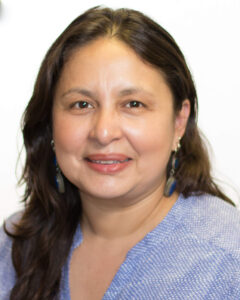
1. How long have you been at UNCG?
For six years.
2. How did you get interested in your field of research?
My research program seeks to advance knowledge on how social exposures related to immigrant status, where we live (e.g., neighborhoods) and socioeconomic condition pattern cardiovascular health in adult life, particularly for people of Latin American origin. I have both an academic and personal connection to this area of research. My family migrated to the U.S. when I was five years old, and I grew up in communities where people worked really hard to make a better future for themselves and their children. My parents, for example, worked in factories their entire lives until they retired. I saw what they endured and what so many others in Latino community and immigrant communities more generally experience. For me, this early life experience and my own journey navigating hardships as a young adult woman crystallized my desire to enter public health to reduce suffering and improve well-being. When I completed my Ph.D., I realized the most impactful line of research I could pursue would be to engage in topics I was deeply familiar with, one that would raise new questions about immigrant health and in the process, better reflect the realities of this community to arrive at more effective public health solutions.
3. What research are you currently working on and what does it entail?
My research program currently involves understanding how various social conditions and their interconnection shape cardiovascular health, specifically physical activity and diabetes inequities. I have been particularly interested in recent years in advancing research on prediabetes status, given that it is a reversible stage of cardiovascular risk and if eliminated early can prevent progression to diabetes. Most work to date in this area, however, has focused on weight control strategies. My team and I are extending this focus to demonstrate the critical role of “multi-level” or “socioecologic” to determinants shaping pre-diabetes risk, particularly for immigrant and other racialized communities. I am also working with local partners and colleagues in Kinesiology to use novel, real-time data capture methodologies involving mobile phones, geolocation codes, and accelerometers to establish the role of perceived and objective built environment features influencing physical activity in Latinas.
4. What future research projects would you be interested in working on?
I am excited about the interdisciplinary research I am conducting with colleagues in Kinesiology. I think we bring unique strengths to our work, but also have a shared interest in using novel methodological approaches to improve health in racialized communities. Based on our pilot study, we are exploring new studies that can advance multi-level physical activity research focused on Latinas and plan to partner with community-based agencies to design interventions that can mitigate physical activity barriers.
5. What inspired you to get into science and research?
See above.
6. What encouragement would you offer to other females just getting involved in research and scientific fields?
Remain steadfast on both your scholarship and the passion that fuels you. This is especially the case for minoritized scientists and those pursuing health equity research. For many of us, we entered science to feed our scholarly pursuits but also to ensure that our work makes a difference in people’s lives. Both things are possible. Surround yourself with people that will support you on this mission.
Dr. Jessica McNeil, Department of Kinesiology
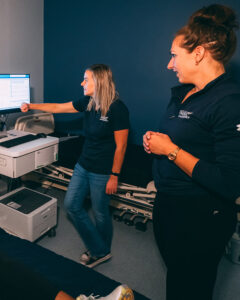
1. How long have you been at UNCG?
I began working at UNCG as an assistant professor in the Department of Kinesiology in January 2021, a little over three years ago.
2. How did you get interested in your field of research?
I was first interested in research when I took an undergraduate course called, “Diet and Physical Activity.” Not only was I interested in this topic, one of the assignments was to write a short literature review on a topic of choice related to diet and exercise.
Completing this assignment allowed me to pick a topic of interest and learn more about it through research and reading scientific articles. I was immediately hooked after that experience, as I went on to complete a fourth-year undergraduate-level research project with the instructor of this course (who later became my master’s and doctoral advisor).
3. What research are you currently working on and what does it entail?
I recently received funding from the NIH (National Institute of Health) and NHLBI (National Heart, Lung and Blood Institute) to assess the role of sleep on risk factors for obesity and cardiometabolic health outcomes, which include measures of diet, physical activity, metabolism, hydration, and stress markers in Black emerging adults 18-28 years old.
This is a very novel project that will include the most comprehensive measures of sleep (via self-reported, actigraphy, and polysomnography) in Black emerging adults, with the ultimate aim of better understanding the role of sleep in obesity and cardiometabolic disease risk in this population.
Doing so will help to identify targets for sleep-related interventions to reduce the risk of obesity and cardiometabolic diseases in Black adults, particularly during a developmental period (emerging adulthood), when many health behaviors are more malleable.
One of my Ph.D. students (Hannah Koch) will also be leading a very interesting dissertation project which focuses on the role of sleep on diet, physical activity, metabolism and appetite, and the impact of these different factors on body weight and body composition changes since surgery in adults who have undergone surgery for obesity (commonly known as bariatric surgery).
Much of my research at UNCG to date has focused on the role of sleep and energy balance (diet and physical activity, metabolism) in chronic disease prevention, with a primary focus on obesity and cardiometabolic disease risk.
4. What future research projects would you be interested in working on?
I plan to continue conducting research in sleep, energy balance, and chronic disease risk. I also have extensive experience conducting research in exercise prescription for cancer prevention and survivorship. While I continue to actively collaborate with colleagues and publish research in this area, I am not currently leading exercise interventions in cancer survivors at UNCG. I would be interested in revisiting this avenue of research in the future.
5. What inspired you to get into science and research?
Learning from my instructor at the undergraduate and graduate levels about their ongoing research and the potential to answer very cool research questions about health, exercise and potentially make a difference (at an individual level, but also at a population level).
A lot of research can be used to inform clinical and non-clinical practices (e.g., how to promote exercise and which exercise recommendations or special considerations exist when working with different populations) and can even be used to inform policy at a population level. Research can be an extremely powerful tool to help build knowledge and inform your work, no matter your profession.
My graduate advisor often told me that, “you will never run out of research ideas to pursue,” as there is always something we can learn or want to know more about.
6. What encouragement would you offer to other females just getting involved in research and scientific fields?
Identify and work closely with mentors at different stages of their careers and don’t be afraid to ask questions or seek advice from them. You will not know everything or become an expert at all types of research or measurement techniques, and that’s ok — that’s why you have colleagues in different areas of research or career stages who can assist. I am very fortunate to have had the opportunity to work with mentors who are extremely supportive of graduate students and junior faculty and seeing them succeed.
I have had peers/colleagues with advisors who were not as supportive and that allowed me to see what type of mentor (or colleague) I do not want to be (or a style of advising I want to avoid).
While these may be unfortunate circumstances, it does allow you to see both the “good and the bad” sides of advising/mentorship and to learn from these opportunities, as you begin to advise your own students.
I also consider many of my peers (i.e., faculty at a similar career stage as me) as mentors and I often go to them for advice and questions about research, career development opportunities, managing work-life balance, and other demands as they often “get me,” since they are at similar career stages.
In sum, surrounding yourself with a strong support system in research is extremely important to seek advice, keep yourself grounded, and remind yourself of the positives of research, despite the high failure rates faced when applying for grants and submitting papers for publication (i.e., despite the high rejection rates tied to grant and manuscript submissions, keeping in mind why you believe in this research project and why you want to see it through).
Dr. Jessica Obermeyer, Department of Communication Sciences and Disorders
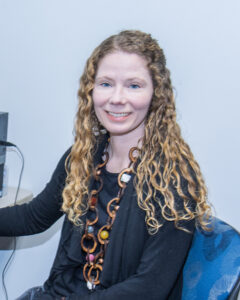
1. How long have you been at UNCG?
This is my fifth year at UNCG.
4. What future research projects would you be interested in working on?
I am interested in creating an assessment tool that evaluates typed language production in people with aphasia. I believe this is really important since typing has become such a central mode of communication.
5. What inspired you to get into science and research?
The people I work with clinically! Every day I was trying to help people achieve their goals and I wanted more resources to help me do that. I became a researcher so I could be at the forefront, creating the tools that can help clinicians and people with aphasia.
6. What encouragement would you offer to other females just getting involved in research and scientific fields?
Keep your curiosity alive and try to develop a support system of peers and mentors. These will be the people who you can lean on when times are tough and who will celebrate with you when times are good.
Dr. Lenka Shriver, Department of Nutrition
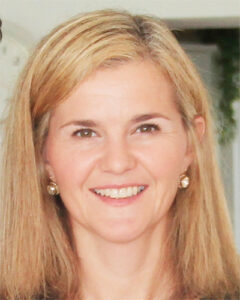
1. How long have you been at UNCG?
I joined UNCG in August 2013 from the Department of Nutritional Sciences at Oklahoma State University.
2. How did you get interested in your field of researcH?
I got immersed in child nutrition research during my graduate program, when I worked as a research assistant on a variety of community-based nutrition projects with low-income families. I quickly fell in love with research on child nutrition because it is such a diverse area of investigation and is relevant to solving the current obesity epidemic which represents one of the most pressing public health issues in the U.S. and around the globe. Many of the key issues within child nutrition are interdisciplinary in nature, and I was very excited to work with people who have expertise across multiple disciplines.
In addition to child nutrition and obesity, I also teach and conduct research related to nutrition and exercise. My passion for sports nutrition stems from being a competitive athlete. I grew up playing tennis in the Czech Republic and as a teenager I played on the Czech National Junior Tennis Team. I eventually moved to the United States to play collegiate tennis at a Division 1 university. As an undergraduate student, I quickly realized the importance of nutrition not only for high-level athletes but also for the general population. My research in sports nutrition focuses on optimizing athletes’ diet for better performance and recovery, as well as helping athletes follow healthy diets after they transition out of competitive sports.
3. What research are you currently working on and what does it entail?
I am working on two large projects funded by the Eunice Kennedy Shriver National Institute of Child Health and Human Development that are centered around childhood obesity prevention. The first is, “Biopsychosocial Predictors of Obesity During the First 2 Years of Lie” and is known as “iGrow.” The most recent study is, “Food and Non-Food Self-Regulation in Children’s Obesity Risk: A Biopsychosocial Perspective,” and is known as the iGrowUp study. My work on these projects is very much interdisciplinary in nature as our team consists of researchers with expertise in human development, nutrition, kinesiology, and psychology.
Our longitudinal iGrow study, including 200 pregnant individuals and their infants, is to identify key biopsychosocial factors that increase or decrease childhood obesity risk in early life, between infancy and toddlerhood. We use a variety of assessments, such as parental self-report of infant/child behaviors, collection of infant urine and saliva samples, mother-infant/child feeding observations and anthropometric measurements from mother-child dyads (e.g., height, weight, body composition).
iGrow is a very unique study because it examines a wide range of biopsychosocial factors simultaneously while focusing on the critical developmental period of infancy for obesity prevention purposes. Our data collection started in 2019. We also aim to make a significant impact in practice by sharing our findings with pediatricians and other health care professionals working with pregnant women and families with young children.
The iGrowUp study examines child self-regulation in relation to obesity. Previous findings, which come mostly from cross-sectional research, suggest that self-regulation, one’s ability to control one’s responses to the environment, is associated with a greater obesity risk across the lifespan. However, previous research has not established what types of self-regulation (i.e., emotional, behavioral, physiological) and in what context (i.e., general vs. food-related self-regulation) may be important for childhood obesity prevention. Thus, our team is currently assessing self-regulation in a sample of children ages 3-5. Our goal is to systematically measure the different types of self-regulation in both food and non-food challenges to help answer some of the critical questions.
4. What future research projects would you be interested in working on?
Longitudinal research is critical for truly understanding obesity risk development among children. To design more effective obesity prevention programs, we must understand early risk factors and how they interact together starting at pregnancy. Thus, I would love to continue building upon our findings from the two ongoing NIH projects and design new studies that would follow our families with young children into later childhood and adolescence.
5. What inspired you to get into science and research?
Initially, I was simply curious and eager to learn more about the different subfields of nutritional sciences. Since childhood obesity is such a critical global public health issue, I wanted to learn as much as I could from the existing research. But during graduate school, I realized I also wanted to contribute to this area of research with my own original work. I am very passionate about child obesity prevention and my early research efforts drew heavily from my own cultural background and food-related experiences growing up in former Czechoslovakia (now Czech Republic). One of my very first projects was a cross-cultural comparison of parental feeding practices, dietary intake and physical activity among school-aged children in the Czech Republic and U.S., which really started up my research program on child nutrition with a heavy focus on obesity prevention. My experiences as an athlete have naturally inspired me to work on research that advances our understanding of what, when, and why athletes eat and how nutrition can improve or optimize their performance and recovery. I remain fascinated by every aspect of the research process, and I feel lucky to be in an academic setting in which I can explore all my academic interests and work with such amazing students and colleagues at UNC Greensboro.
6. What encouragement would you offer to other females just getting involved in research and scientific fields?
I would encourage them to be proactive and always search for and explore new opportunities for research. I would also advise them not to be afraid to get involved in new collaborations or partnerships, even those that might initially appear to be outside their academic areas of expertise. I got involved in interdisciplinary research early in my career and these collaborations have been amazing for me, both personally and professionally. Through various collaborations, I have been fortunate to meet and become friends with some of the most incredible and wonderful individuals at UNC Greensboro. I have also developed productive collaborations with academics across the United States, as well as Europe. You can make rich connections with other scholars and expand your research horizons if you are willing to build relationships with interdisciplinary teams of researchers.
